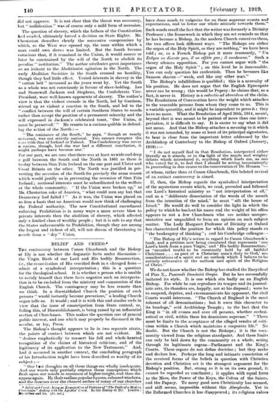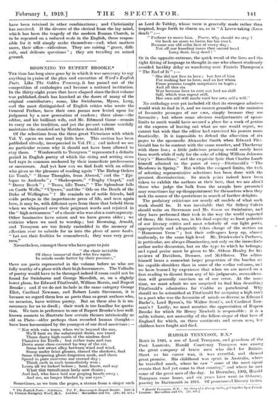BELIEF AND CREED.•
Tee controversy between Canon Glezebrook and the Bishop of Ely is not whether the dogmatic facts under discussion— the 'Virgin Birth of our Lord and His bodily Resurrection, i.e., the resuscitation of His crucified flesh in a changed form— admit of a symbolical interpretation ; this is a question for the theological school. It is whether a person who is unable to satisfy himself that these facts negative such an interpreta- tion is to be excluded from the ministry and communion of the English Church. The contingency may be less remote than we think. In a disestablished Church the position of such persons " would instantly become precarious," a leading Church organ tells us. It would ; and it is with this and similar ends in IOW that the issue of emancipation from State control, or, failing this, of Dieestablishment, is being raised by an influential section of Churchmen. This makes the question one of general public interest, and one which may properly be discussed in the secular, or lay, Press.
The Bishop's thought appears to lie in two separate strata, the points of contact between which are not evident. He "desires emphatically to reassert his full and whole-hearted recognition of the claims of historical criticism, and of the legitimacy of its application to the New Testament." And, had it occurred in another context, the concluding paragraph of his Introduction might have been described as worthy of its subject;— "Our I art thoughts on all these things arc wholly inadequate. And our words only partially express those conceptions which flash upon our minds in momenta of higher insight, and then dis- appear again. By their realism popular hymns, coloured windows, and the frescoes over the chancel arches of many of our churches • Mei and Creed : an Branimation of Portion. of • The Fadh qa Mod.. Chneannow" dealing tedlt as divided' Creed. ey the Bishop of Etr. London Ate suttee sad Co. iss. new
have done much to vulgarize for us these supreme events and expectations, and to lower our whole attitude towards them."
Such words recall the fact that the writer was formerly a Divinity Professor ; the framework in which they are set reminds us that he has become a Bishop. As the modern Church conceives them, the two offices look different ways. " The Bishops are either the organ of the Holy Spirit, or they are nothing," we have been told ; or, as a French Bishop put it more resonantly, " Etique tic discute pas, it are Witte pas ; it condainne." Such a theory silences opposition. For you cannot argue with " the organ of the Holy Spirit " ; on this level he is inaccessible. You can only question his credentials. Then he becomes like Samson shaven—" weak, and like any other man."
The Bishop's infallibilism is qualified ; this is a necessity of his position. He does not argue that the English Episcopate never eau be wrong ; this would be Popery: he claims that, as a fact, it never is. History is a rednctio ad absurdum of the claim. The Resolutions of Convocation have the weight which attaches to the venerable persons from whom they come to us. This is
a variable quantity, and it might be imprudent to press it : they have no more. What the Resolution of April 30th, 1914, meant,
beyond that it was meant to be patient of more than one inter- pretation, it is difficult to say. It is easier to say what it did not mean. And that the Bishop attaches a meaning to it which it was not intended, by some at least of its principal signatories, to bear is clear from the important letter addressed by the Archbishop of Canterbury to the Bishop of Oxford (January, 1918) :—
"I do not myself find in that Resolution. interpreted either literally as it stands, or in the light of the ample and weighty debate which introduced it, anything which leads me, as one who voted for it, to feel that I should be acting inconsistently in proceeding in due course to the consecration of Dr. Henson "- at whom, rather than at Canon Glazebrook, this belated revival of an extinct controversy is aimed.
If, then, the Bishop regards the symbolical interpretation of the mysterious events which, we read, preceded and followed our Lord's historical ministry as " not interpretation at all," and as a "deliberate dissociation of the words of the mouth from the intention of the mind," he must " sift the house of Israel." He would do well to consider the light in which the policy to which he has lent his name and the weight of his office appears to not a few Churchmen who are neither unrepre- sentative nor unqualified to form an opinion on such subject matter. The Lady Margaret Professor of Divinity at Oxford has characterized the position for which this policy stands as "the bankruptcy of thinking"; and his Cambridge colleague- " The Bishop of Ely's action in regard to Canon Glazebrook's book, and a petition now being circulated that represents our Lord's birth from a pure Virgin,' and ' His bodily Resurrection,' as 'revealed truths to he constantly held by all faithful Christians . . . as part of a Christian man's duty to Clod,' am manifestations of a spirit and an outlook which I believe to be entirely subversive of the outlook and spirit of the Religion of Christ."
We do not know whether the Bishop has studied the Encyclical of Pius X., Pascendi Deminici Gregis. But he has successfully
imitated its style. It is one which site badly on en English
Bishop. For while he can reproduce its temper and its journal- istic arts, its thunders are, happily, not at his disposal ; were he to suspend, deprive, and excommunicate his opponent, the civil Courts would intervene. "The Church of England is the most tolerant of all denominations ; but it owes this character to its bondage," said Archbishop Temple ; to the fact that the King is " in all causes and over all persons, whether ecclesi- astical or civil, within these his dominions supreme." " There must he limits to the acceptance of the alleged results of criti- cism within a Church which maintains a corporate life." No doubt. But the Church is not the Bishops ; it is the com- munity viewed from the religious standpoint. And these limits can only be laid down by the community es a whole, acting through its legitimate organs—Parliament and the King's Courts. These organs do not define doctrine ; but they make and declare law. Perhaps the long and intimate association of the received forms of the beliefs in question with Christian
devotion and Christian art is the strongest argument for the Bishop's position. But, strong as it is on its own ground, it cannot be regarded as conclusive ; it applies with equal force
to the Mass, the Power of the Keys, the Cullum of the Saints, end the Papacy. To many good men Christianity has seemed, and still seems, impossible without this Aberglanbe. Yet in the Reformed Churches it has disappeared ; its religious values have been retained in other combinations ; and Christianity has survived. If the divorce of the clerical from the lay mind, which has been the tragedy of the modern Roman Church, is to be repeated on a reduced scale in the English, those respon- sible for it will simply make themselves—and, what matters more, their office—ridiculous. They are raising "grave, diffi- cult, and delicate questions" ; they are treading on mined ground.



































 Previous page
Previous page